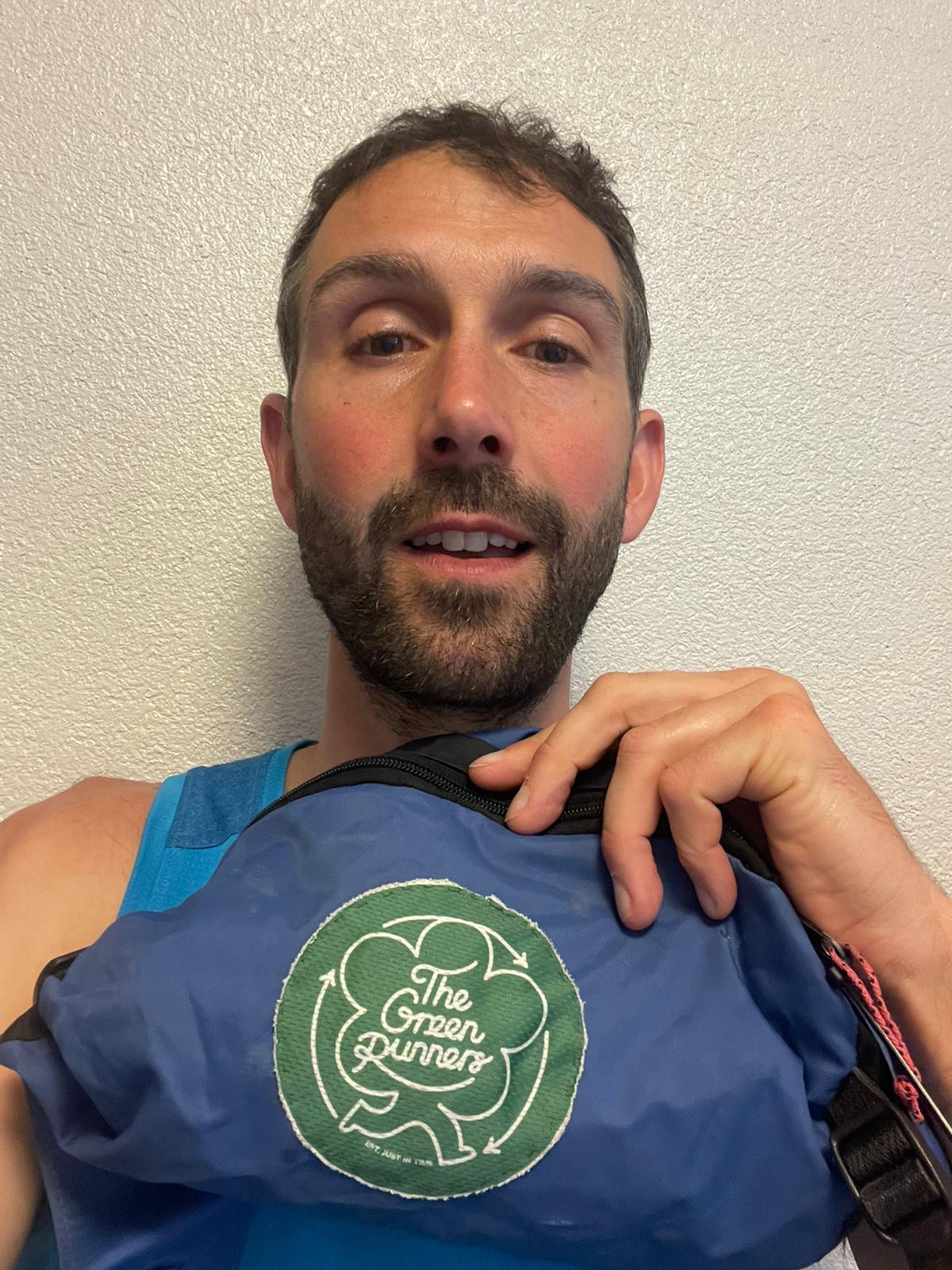
One of our co-founders, David Starley, recently chatted to Scottish Ultra Runner and legend in the running community, Finlay Wild. They delved into all things green running and his incredible British Fell Running Championship where he got the train, cycled 65km, won the race, broke the record and cycled part way home again!
It’s an inspiring story that shows being more sustainable doesn’t mean sacrifice, and can in fact be a lot of fun.
DS: Before we get into your recent race can you tell us how your running journey started?
FW: “I was lucky to grow up with parents who love the outdoors in Fort William. I was always out biking, walking and climbing trees. I enjoyed the Scouts, my own hill walking and rock climbing and after uni gradually got into running as a way to see and do more. For me it was for the freedom of running, travelling light and moving through the terrain. Now it is a massively important part of life and my daily routine.”
DS: So when did you start getting into racing and serious running?
FW: “My first recorded race was 2005 but my first big win was the Ben Nevis Race. I had been 4th or 5th a few times before my first win in 2010 and things went from there. I’ve now won it 10 consecutive times so it will be great to get back to that and have a crack at a good time.”
DS: What is it about Ben Nevis that is so special and keeps you going back?
FW: “Being the highest point in the country has a lure of course but having grown up there, and moved back, it’s on my doorstep. I train there, spending so much time in summer and winter climbing, running, on skis, on my own, with friends. These layers of memories make it an important place for me. The place may change with the seasons, but it is a constant in my life.”
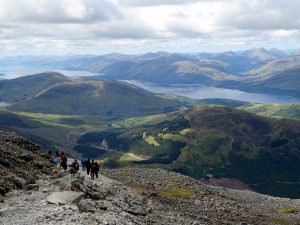
DS: The Green Runners is all about the running community making changes for a fitter planet and about the environment, why did you join?
FW: “I joined pretty much as soon as it launched. It’s a great inclusive idea to get people talking and using their voice together. Whatever your level of knowledge or the changes you have made in your life, we can keep pushing for climate action together. I am so keen to be a part of it.”
DS: We are very happy to have you and the momentum is really building. It’s so inspiring to read people’s pledges. What were your Green Runners pledges?
FW: “Firstly travel: I haven’t flown since 2018. I’m not saying I’ll never do a flight again but trying to keep it to a lower level and continue to look at local options that are going to be as fun and rewarding.
Kit wise, I have been running for a long time so I do have quite a lot of kit, and it’s well used. But for someone who runs a lot, shoes are always difficult. I try and use what I’ve got and question what I want versus need. I’ll continue to use and fix up what I’ve got. Saves me money too which is another incentive to keep kit going!
For eating and fuelling, I’ve been primarily plant based for the last 5 years. Seems really good from a performance point of view, works well for me and I’m excited about cooking different stuff. I’d like to get more organised for making my own snacks for big hill days. I still use gels and quick access stuff for serious races and record attempts but for training I’ve started making my own fruit loaves and energy balls, I enjoy eating homemade.
And speaking up, I’ll continue to use any opportunities I get and forums like this to talk about the issues and raise the profile of climate discussion in running and my interactions in general.”
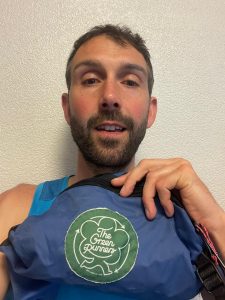
DS: That’s great, really sums up what the Green Runners is about! First of all being aware of the impacts and then making more conscious decisions around choices that might work for you and aren’t hugely costly or inconvenient.
So coming on to your recent fell race, Buckden Pike, how did you get there with low carbon transport?
FW: “Yeah Buckden Pike is a race I’d not done before, it’s an old classic in the Yorkshire Dales from the tiny village of Buckden where they have a gala on race day. It’s a short race as part of the British fell running championships – only 6km with 500m of ascent and the record was just over 30mins. I was keen to go but it’s a long way from Fort William and I had some work commitments to fit around it. So late on Thursday I drove to Glasgow; I am lucky enough to have an electric car at the moment, it’s not got great range but is good for short distances. Got my work out the way on Friday morning and with my bike kit all ready set off for the hour’s ride to Glasgow train station.
I’d pre-booked my bike on the train and even though I was a wee bit last minute, (no surprise for those that know me), it was very easy to pop my bike on the train for the couple of hours down to Oxenholme, a tiny station in the Lake District. I had all afternoon to then cycle the 65km over to the Yorkshire Dales. I’d plotted a course on my watch and just followed that, it was great fun! I wasn’t looking forward to driving all that way just for a short race so this way I could make it into an adventure, exploring new places. I hadn’t looked at the contours and it was a bit hillier than I thought but the race wasn’t until Saturday afternoon so I still had time to walk around the course and get plenty of rest and food. A really fun and rewarding way to get to the race.
The race itself was a tough field with lots of guys I thought would be faster than me on short terrain. So I went hard, running with Dan Haworth, neck and neck, really fast actually. Both going hard and sticking with each other. I got him on some descents, then he got back in front on another uphill. There was a narrow gap in the wall just before the steep final descent and I managed to get away and down into the field. Lungs burning, legs exhausted. The record was set by Colin Donnelly in 1988, he’s got several records that have stood the test of time, including the half Ben Nevis up here in Scotland which I never get anywhere near so I wasn’t expecting to beat it. But trying to get away from Dan and the level of competition pushed me on to get the win and the record by 12 secs. Delighted with that!
I quickly bonked, so after food, chatting to folk and chilling out a bit, I realised it wasn’t so sensible to bike for 4 hrs feeling how I was. I managed to find a lift back towards the Lakes about 10km from Oxenholme, so had a nice leg stretch cycling to the train back to Glasgow. It was a fun trip. Amazing to get the record and have such a battle in the fells but also this other element of the adventure getting there.”
DS: It would have been easier to drive door to door so what was it that ‘drove’ you to not do that?
FW: “Primarily it was through trying to do things in a more environmentally conscious way. Like the sky races I was doing in Europe before the pandemic. I did the Zegama race in the Basque region of Northern Spain and travelled by sleeper from Glasgow to Euston, Eurostar to Paris, a lovely high speed from Paris 4 hours down to the south of France then a few small trains through Spain. It was a fun experience, less hectic than airports and a bit more time to chill and read; being on the train is generally more relaxing. I like it. So I knew it was going to be a more fun experience taking this approach for Buckden. And I couldn’t find someone to get a lift with so the idea of driving on my own wouldn’t be great for my carbon footprint.”
DS: I like that it’s more fun, it doesn’t have to be a chore to choose a more sustainable way!
FW: “Yep, drilling into that a bit: You just want to get there right, you look on Google maps and see it’s a 3 hour drive. but that is just doing what is necessary. How about building in more adventure time. It’s all about the journey. You can take the attitude of just get it done or include the journey as part of the experience and have more fun.”
DS: And do you think travelling by bike improves your performance?
FW: “Well I don’t think it hinders it! I don’t push it, I’m just pootling along taking things in and spinning the legs is probably better than sitting in the car and getting stiff so it definitely doesn’t hinder me. The recovery seems quick in general. There could also be benefits from being relaxed and putting things into perspective. Sometimes you are so focussed on performance that if you don’t do well then you get really downbeat. Subconsciously I thought I might not win but I will still have the adventure on the bike, so the journey gave me another focus as well. I think it’s fairly healthy not to have all my psychological eggs in one basket in terms of having fun and the reward.”
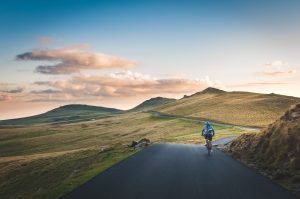
DS: Moving on: In your opinion is the running industry currently sustainable?
FW: “Ohh a difficult one! In some ways running is so simple, you just need shorts and shoes to get out there. It should in theory be the most sustainable but in reality is a massive industry with marketing, new styles, and fast fashion just the same as everything else and so that side of it, no is not sustainable.”
DS: So leading on from that, what do you think needs to change to make running more compatible with the low carbon, green future we all want?
FW: “For individual runners it comes back to the things The Green Runners champions. It is likely that our travel is the biggest source of our carbon footprint. So trying to reduce that and picking the races you really want to do and travel less. Maybe make it a longer experience, use public transport, do it every 2 years for example, whatever works for you.
But industry wise, we should be speaking up, saying that all the new gear and fast fashion is not what we want, not fall prey to the campaigns that say you need a new coat because it is 5g lighter…practise what we preach and keep using the kit we already have. Ask the question: do I need it or just want it? And also look at where it is coming from and the supply chain. If we’re talking about it and thinking about it then that is a step in the right direction. And finally share it to inspire others and help people think about more conscious decisions.”
DS: I think the industry could help us by being more transparent about their supply chain rather than us as individuals having to do all the digging ourselves. If we are more informed we can make positive choices.
FW: “Yes, I’m a GP and the same conversation is happening in the pharmaceutical industry, with inhalers for example. They have a high footprint with the greenhouse gases that are in them, so we are trying to change where appropriate to a dry powder inhaler that has a lower carbon footprint. It’s absolutely not about trying to make people feel guilty – if they need them they should keep using them but when everything else is equal and it’s not going to impact your health, then why not go for the lower footprint option? And it is that level of questioning that is important in running. Thinking more about balancing your joy and needs with carbon cost.”
DS: So, what is next for you?
FW: “More Scottish Races. I need to do more medium races for the British Champs so have a 16km one next weekend down on the Scottish borders. I’m thinking about getting there on the bike because I’ve got a bit hooked on it. I had a week off work recently and went to Aran for the Goatfell race. I spent the week exploring the island and then headed over to Jura for a race there the following Saturday. It was a lot of fun, everyone else was rushing around but I was just exploring on my bike, it felt like I was on a whole different timescale.”
DS: From your travel experiences do you have any tips for runners who want to reduce their footprint?
FW: “You can go for the low hanging fruit like car sharing, if that works for you then that’s a good start. The cost of public transport is an issue, I would like to see government action on that, but there are things I love like the West Highlands railcard that gives you 15% off so there might be stuff like that in your area. Booking trains in advance, you can cancel them for free and you tend to get a cheaper fare. But you need to be organised and that’s often not me!
There are also some websites like Seat61 and Rome2rio that I use for travel advice and planning public transport that have been useful. And pester your employer to give extra travel days, so if you don’t fly you have extra days to use public transport. Plays into the idea of enjoying the journey and you can always work on the train.”
DS: Finally a question from our community, might you have another crack at the Bob Graham Round and go for Kilian Jornet’s record?
FW: “Well I was so close before but it was my hardest run ever, an amazing experience. I don’t know if I can improve, lots of things lined up well for that attempt so I would still need all that and a few other things to go right. It’s no secret I would love to improve my time but I’m not sure if it’s possible!”
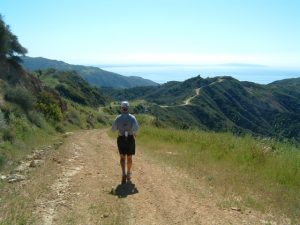
DS: So just to finish up, in your opinion why is it important to act on climate change?
FW: “It’s widely said that the climate crisis is the biggest threat to humanity. The spiral of rising temperatures and destabilising events in terms of climate, mass migration, food and water supplies, breakdown of the eco-systems to sustain life. Time is running out, we have less than 10 years to make massive changes because some of the impacts are already locked in. It will take a while to stop so we need to start doing everything now. It is imperative to civilisation.”
DS: Absolutely agree, and what is the one thing you would like our community to take away from this conversation?
FW: “I suppose in a simple way, that I have shown that you can perform well, win a race and break a 34 year record despite riding a bike and sleeping in a tent. The performance aspect isn’t an excuse not to do these things and hopefully this makes other people think what could I do to have more fun with that? Running is play and we want to have fun with it, so this is a different way to mix things up and keep it interesting.”
Thank you to Finlay and David for a really inspiring conversation. It demonstrates beautifully how doing things in a more sustainable way doesn’t have to be a chore, it can be exciting and engaging. If we are going to get over this climate crisis and make changes we have to find fun and enjoyment in the solutions. It’s easy to get lost in despair and overwhelm so being able to unlock positive solutions is really powerful.
Join our Green Runners community and help us make positive changes for a fitter planet.

